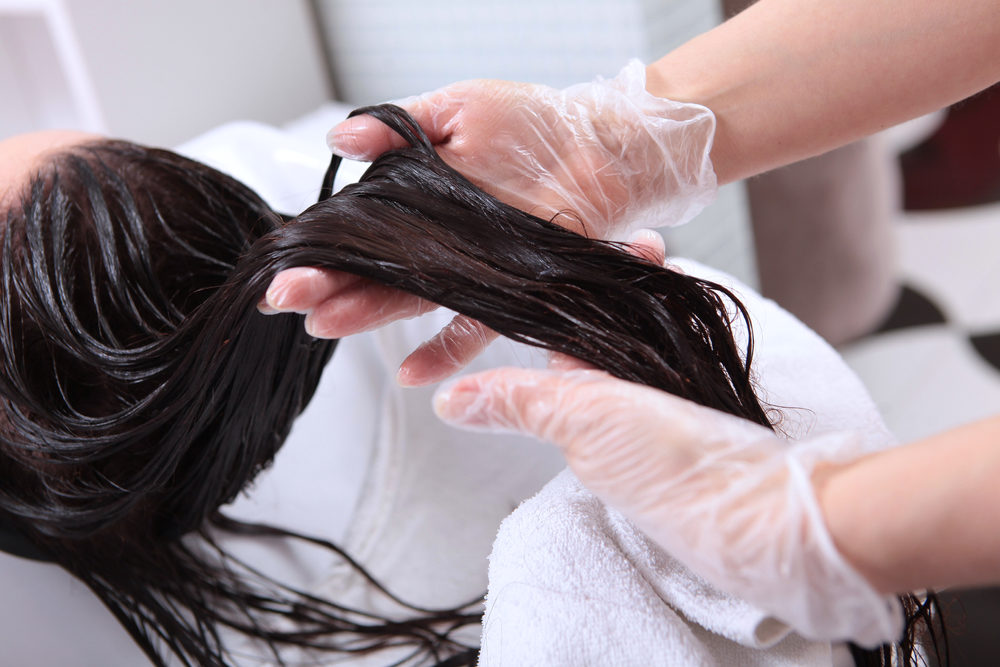
Many women across the country apply chemical straightening products to their hair, unaware of the potential health consequences these chemicals may have on their bodies. A recent study is shining a light on the danger chemical hair products may pose, placing millions of women at an increased risk of developing uterine cancer.
Link Between Hair Straighteners and Uterine Cancer
The National Institutes of Health (NIH) released a study linking women who regularly use chemical hair straighteners to an increased risk of developing uterine cancer. Women in this study who used hair straightening products were nearly twice as likely to develop uterine cancer.
When diagnosed with uterine cancer, patients have one of two types. Endometrial cancer is the most common type and can be cured with treatment and/or surgery in most cases. Uterine sarcoma is diagnosed less in women but is more aggressive and challenging to treat.
In 2019, over 822,380 women were living with uterine cancer in the U.S. It’s estimated that in 2022 there will be 65,950 cases of uterine cancer, and sadly, more than 12,000 women will pass away from uterine cancer, shattering families and friends left behind.
Participants in the NIH study were followed for an average of 11 years. From the over 33,000 participants, over 7% were self-identified as Black, and over 4% were self-identified as Latina. Of the study participants, 378 cases of uterine cancer were diagnosed. Twenty-nine cases of uterine cancer in Black women and 14 cases of Latina women were diagnosed during the study. The effects may be more significant for Black and Latina women because they’re more likely to use hair straightening products.
Che-Jung Chang, Ph.D., one of the study’s authors, shared, “Because Black women use hair straightening or relaxer products more frequently and tend to initiate use at earlier ages than other races and ethnicities, these findings may be even more relevant for them.”
In another study by Michigan State University in 2020, Black and Latina women reported feeling pressured by society and economic factors to conform to Euro-centric hairstyles. This often meant conforming their natural hair to long, straight hairstyles. From this study, 80% of Black women reported altering their natural hair to reduce discrimination and microaggressions in the workplace. Many Black and Latina hairstyles are perceived to be less professional and acceptable in the workplace.
Also, CNN reported that Black women with natural hairstyles, such as braids, twists, or afros, were less likely to get job interviews than Black or White women with straightened hair. Long, straight hair is the perceived standard of beauty for women in the workplace. This standard of beauty is biased against Latina and Black women who choose to wear their hair naturally.
With the release of the hair straightener cancer risk study, there is now a potentially life-altering choice in front of women who use these products. Continue the hair-straightening chemical processes while putting their health at risk, including an increased risk of uterine cancer, or embrace their natural hairstyles. It seems like an easy decision, but when it comes to economic factors, like earning a wage, affording education, paying rent or the mortgage, those with natural hairstyles may be risking their economic power.
How Do Chemical Hair Straighteners Work?
Chemical hair straightening products work by permanently altering the structure of a strand of hair. These chemical compounds cause a permanent change in the hair, eliminating any texture, and leaving a smooth, chemically treated hair strand. After the first session of relaxing hair, re-touches are required to maintain the straightened hair. On average, these re-touch-up sessions occur every four to eight weeks.
Some women have reported using hair straightening for most of their life. Chemical hair products don’t just stay on the hair; they also soak into the scalp. The scalp easily absorbs materials, including the chemical components of hair straightening products which could include formaldehyde, parabens, and phthalates. Many of these chemicals are carcinogenic, meaning that they can cause cancer or increase the likelihood of developing cancer.
Other Cancers Tied to Hair Products
While this new study connects chemical hair straightening products to uterine cancer, additional cancers may also be linked. Participants in this study are part of the Sister Study, an ongoing study conducted by the National Institute of Environmental Health Services (NIEHS) that seeks to identify risk factors for breast cancer and other health conditions.
In a study published in 2021 in Carcinogenesis, researchers determined that Black women are affected by aggressive types of breast cancer, including estrogen receptor negative tumors, diagnosed at young ages and are more likely to die from breast cancer. While the link between chemical hair straightening and breast cancer requires further study, researchers agree that chemical hair products can contain estrogen-disrupting components, which can contribute to an increased risk of breast cancer. It is estimated that Black women are six times more likely to be diagnosed with breast cancer.
Hair Straightener Cancer Lawsuits
Days after the release of the NIH study, federal lawsuits were filed against manufacturers of chemical straighteners and hair relaxers. The plaintiffs allege that their use of these chemical hair straightening products contributed to their diagnosis of uterine cancer. Beauty brands named in these lawsuits include L’Oréal, SoftSheen Carson, Strength of Nature, Dabur, and Namaste Laboratories. The lawsuits argue that these companies knew or should have known that the products they made and distributed increased the potential of developing cancer. However, they failed to warn consumers that using these products was potentially hazardous to their health.
If you or someone you know has used chemical hair straightening products and has been diagnosed with uterine cancer, seeking legal advice is essential. You can begin evaluating your legal options by consulting with a personal injury attorney with experience in product liability lawsuits related to haircare and beauty products. Seeking compensation for medical costs, loss of income and employment, and damages may help you recover from a devastating illness such as uterine cancer. For a free, confidential legal consultation, contact me, Jessica Ramirez, at D’Arcy Johnson Day, a premier litigation law firm, at 866-327-2952 or visit us online.

From sexual abuse matters to personal injury and workers compensation, Jessica brings a wealth of experience to her practice at D’Arcy Johnson Day. Her fluency in both English and Spanish enables her to help so many members of the community, as she focuses on sex assault and personal injury cases, work injuries, medical malpractice, immigration, criminal law, and municipal court proceedings among other areas of practice.















Comments for this article are closed.